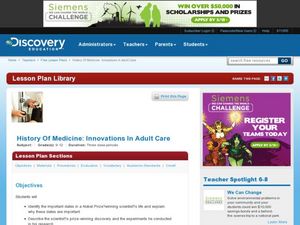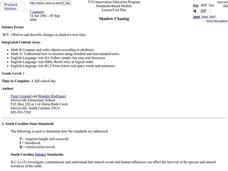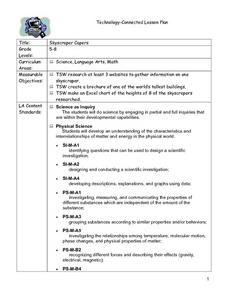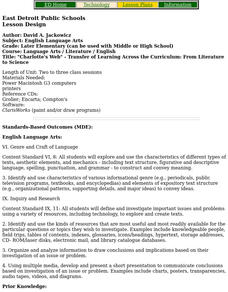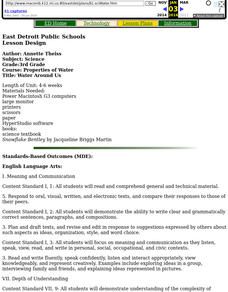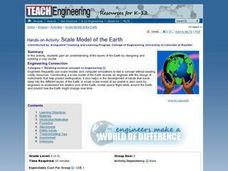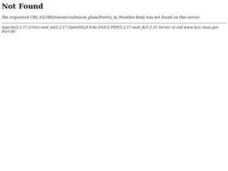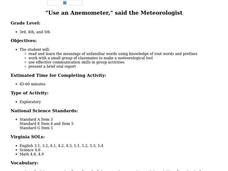Curated OER
Innovations In Adult Care
Learners study scientists and the important Nobel Prize dates. In this investigative activity students divide into groups and watch a program then complete a project.
Curated OER
Greek Prefixes In Science
Seventh graders look into their science textbooks to find words that utilize the Greek prefixes, "anti," "epi," "endo," and "micro." Student pairs complete a worksheet embedded in the plan where they list as many of these words as they can.
Curated OER
Shadow Chasing
First graders observe and measure their shadows. They go outside at three hour increments during the course of a day. Each time students measure and record the length of their shadows. Students read books about shadows and discuss why...
Curated OER
Non-Fiction Read-aloud
Students listen to the reading of a book about the area of science they are currently studying.
Curated OER
What is a Cloud
Third graders study clouds and how they are formed. They write acrostic poems about clouds and analyze and graph temperature data collected during varying degrees of cloud cover.
Curated OER
Cloud Databases
Students complete a unit on clouds and a report about one type of cloud. They collect data through observation about different types of cloud cover and then create a spreadsheet to reflect their observations over a 2 week period.
Curated OER
Skyscraper Capers
Young scholars discuss skyscrapers and listen as the teacher introduces the project. They use the Internet to perform research on one skyscraper. Students use information they gather to create a brochure of their building . They create...
Curated OER
Destination Mars!
Fifth graders view Mysteries of Earth & Mars Video on DVD and record thoughts in their online journal. They record data in a spreadsheet about each planet then form a theory of the best time to launch a space craft from Earth to land...
Curated OER
Hurricane Scavenger Hunt
Fourth graders use Internet and/or library resources to locate and record information about hurricanes on a worksheet..
Curated OER
"Charlotte's Web" - Transfer of Learning Across the Curriculum: From Literature to Science
Students research and write about the parts of a spider's body using educational software. They draw spiders using computer software.
Curated OER
Water Around Us
Third graders learn the effects of temperature on the states of water. Then students create paper snowflakes. Finally students complete a computer project with software which teaches the different states of water.
Curated OER
Scale Model of the Earth
Students work together to create a model of the Earth. They label and identify each layer and describing its properties. They discover how engineers use models to test different concepts.
Curated OER
Poetry in Weather
Young scholars observe and identify the various types of clouds. They compare clouds to clouds on a chart, and in small groups compose and present a group poem about clouds and weather.
Curated OER
Life in a Cup
Third graders make and maintain a mini terrarium. They keep a daily journal of what happens in their terrarium and record daily observations and measurements.
Curated OER
Habitats: Rainforest
Students use the internet to find reasons the rainforest is endangered and ways that affects the rest of the world. They read for information, perform experiments, locate rainforests on maps, and write about this ecosystem.
Curated OER
Sink or Float?
Students predict and explore to discover which objects sink or float in fresh and salt water, predict how salt affect objects, write predictions on T chart, discuss difference between man-made and natural waters, and graph results.
Curated OER
Climate/Dust Bowl
Students read the novel " Out of the Dust" and identify environmental issues. They select one of those issues to research and create a slideshow explaining their research and present it to the class.
Curated OER
Looking To The Future
Young scholars examine life now and predict the future. They examine the long timescales involved in space travel
Curated OER
Tee Time: A Lesson About Nonpoint Source Pollution
Students assume assigned roles as citizens in a town meeting where wealthy investors have persuaded the city government to clear an area of town to build a golf course. They are to investigate their roles and prepare a speech in support...
Curated OER
Plants
Students identify and label parts of a plant. They will construct a plant from art material and describe the purpose of each part for the plants survival. Students author a book with pictures and words or a story about a plant.
Curated OER
Five Senses: Brave Little Monster
Students identify which of the five senses is being used at a given time. They read "Brave Little Monster" by Ken Baker and then read the story again as they match student-made cards depicting the five senses to moments in the story.
Curated OER
Fahrenheit vs Celsius
Students make a thermometer and write a paragraph about how they did it.
Curated OER
"Use an Anemometer," said the Meteorologist
Students work in groups to make an instrument the Meteorologists use to measure the speed of the wind after the teacher reads them a poem about the wind. Students then review vocabulary that they studied from their lesson plan.
Curated OER
Chemical Changes by Gems
Seventh graders observe that heat is produced when two substances are combined. They brainstorm how, and then experiment to find out which of two chemicals created the heat.
Other popular searches
- Standard English Usage
- Non Standard English
- Non Standard English
- Standard English, Ebonics
- Standard English Ebonics
- Using Standard English
- Slang and Standard English
- Non Standard English Ebonics


